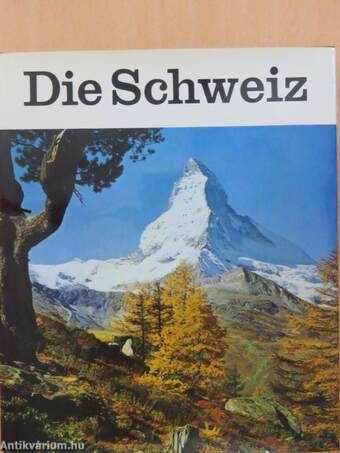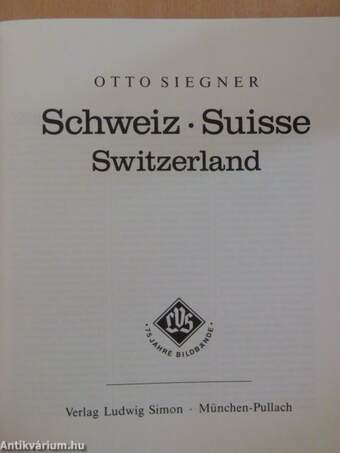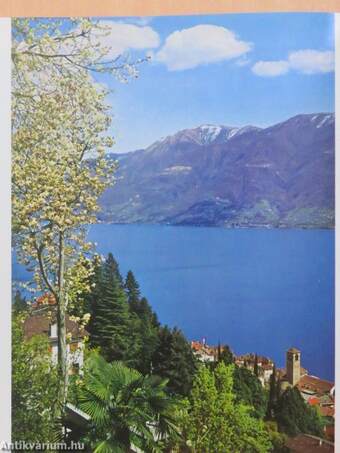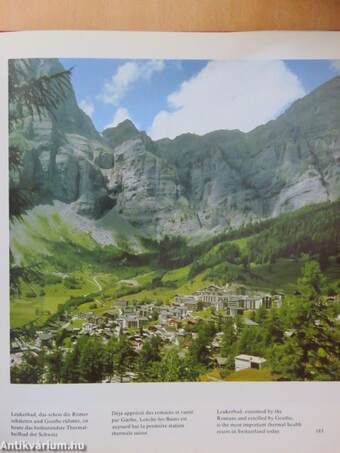1.067.288
kiadvánnyal nyújtjuk Magyarország legnagyobb antikvár könyv-kínálatát

VISSZA
A TETEJÉRE
JAVASLATOKÉszre-
vételek
Schweiz/Suisse/Switzerland
| Kiadó: | Verlag Ludwig Simon |
|---|---|
| Kiadás helye: | München |
| Kiadás éve: | |
| Kötés típusa: | Vászon |
| Oldalszám: | 207 oldal |
| Sorozatcím: | 75 Jahre Bildbände |
| Kötetszám: | |
| Nyelv: | Angol Német Francia |
| Méret: | 27 cm x 23 cm |
| ISBN: | |
| Megjegyzés: | Színes fotókkal gazdagon illusztrálva. |
naponta értesítjük a beérkező friss
kiadványokról
naponta értesítjük a beérkező friss
kiadványokról
Előszó
5
STELLEN wir uns einmal vor, man hätte Schulkinder irgendeines Landes vor die Aufgabe gestellt, ein Bild der Schweiz zu zeichnen; was wäre wohl immer wieder anzutreffen? Ein See, Tannenwälder,... Tovább
Előszó
5
STELLEN wir uns einmal vor, man hätte Schulkinder irgendeines Landes vor die Aufgabe gestellt, ein Bild der Schweiz zu zeichnen; was wäre wohl immer wieder anzutreffen? Ein See, Tannenwälder, eine Sennhütte inmitten saftiger Matten, weidende Kühe und, über dem Ganzen, eine von ewigem Schnee bedeckte Bergkette. So naiv dieses Bild auch anmuten mag, so sehr entspricht dennoch sein tieferer Gehalt der Wahrheit. Die Schweiz besticht den Fremden vor allem durch die Vielfalt ihrer landschaftlichen Schönheiten; ihr Name ruft Vorstellungen von verschneiten Berggipfeln, Abgründen und tosenden Wildbächen, von Matten, Wäldern und klaren Seen wach und läßt nicht zuerst an Kathedralen, Paläste und Museen denken, wie dies etwa auf Frankreich oder Italien zutrifft. Die Natur hat dieses kleine Land nicht nur vielfältig und reizvoll gestaltet, sondern auch seine natürlichen Grenzen festgesetzt und dadurch in hohem Maße seine Geschichte bestimmt. Im Zuge der großen Revolution, die in Westeuropa Renaissance und Klassizismus ablöste, begann die Sehnsucht nach der Natur zu erwachen, und es kam daher nicht von ungefähr, daß man gerade auf die Schweiz blickte, dieses in bunter Vielfalt schillernde Kleinod im Herzen Europas. Es gibt wohl kaum ein Land, das sich rühmen kann, auf so begeisterte Art von Dichtern besungen worden zu sein.
SI L'ON demandait a des enfants de n'importe quel pays du monde de composer un tableau typiquement suisse, qu'y verrait-on presque a coup sur? Un lac, des sapins, un chalet au milieu des prés, une vache avec une cloche au cou et, dominant le tout, une haute montagne couverte de neige. Ce tableau naif exigerait bien des retouches. J1 a cependant quelque chose de profondément vrai. Car la Suisse, avant tout, est un paysage, celui-la meme qui vient d'etre esquissé et beaucoup d'autres encore. Quand on évoque ce pays, ce n'est pas en premier lieu a des cathédrales que l'on songe, a des palais ou des musées, comme pour la France ou l'Italie par exemple. La Suisse fait penser a des pics neigeux, des précipices et des torrents, a des forets et des pâturages, a des lacs aux eaux claires. Ici la nature occupe le devant de la scene et c'est justice. Elle a donné a la Suisse ses frontieres, conditionné son histoire, façonné son visage. Elle l'a faite petite, diverse et belle. Aussi est-ce quand le sentiment de la nature fut éveillé chez l'homme par la grande révolution romantique qui succéda a la renaissance et au classicisme, que la Suisse a été découverte par un monde étonné de s'apercevoir qu'au cour meme de l'Europe il y avait ce petit pays harmonieux dans sa diversité et par sa diversité meme. La Suisse entra ainsi dans l'actualité, parrainée par les noms les plus prestigieux de la littérature.
IF SCHOOL children of any country were given the task of drawing a Swiss landscape, what would most likely be the constant features? There would be a lake, a chalet amid lush alpine meadows with grazing cows and, overshadowing all, a mountain chain covered with perennial snow. However naive such drawings might appear, they would nevertheless be essentially true. Switzerland mainly impresses the stranger with her manifold scenic attractions; her very name conjures up the image of snowy mountain peaks, precipices and raging torrents and of meadows, woods and clear lakes, instead of cathedrals, palaces and museums, as would be the case with France or Italy. Nature endowed this small country with all these charms, determined her natural boundaries, and so, to a large degree, predetermined her history. In the course of the great revolution which, in Western Europe, succeeded the Renaissance and Classicism, there developed a longing for nature and, naturally, people began looking towards Switzerland, the sparkling jewel in the heart of Europe. Hardly any other country can boast of so much enthusiastic praise by the poets; Rousseau, Goethe, Albrecht von Haller, Lord Byron, Victor Hugo-to name a few-expressed so strong an admiration for this tiny country that an ever-growing stream of tourists from all parts of the globe began to follow Vissza
Tartalom
| Németország, Fekete-erdő, nevezetesség, látványosság, természet, táj, városok, történelem |
Témakörök
Jacques Heffe
Jacques Heffe műveinek az Antikvarium.hu-n kapható vagy előjegyezhető listáját itt tekintheti meg: Jacques Heffe könyvek, művekMegvásárolható példányok
Nincs megvásárolható példány
A könyv összes megrendelhető példánya elfogyott. Ha kívánja, előjegyezheti a könyvet, és amint a könyv egy újabb példánya elérhető lesz, értesítjük.









